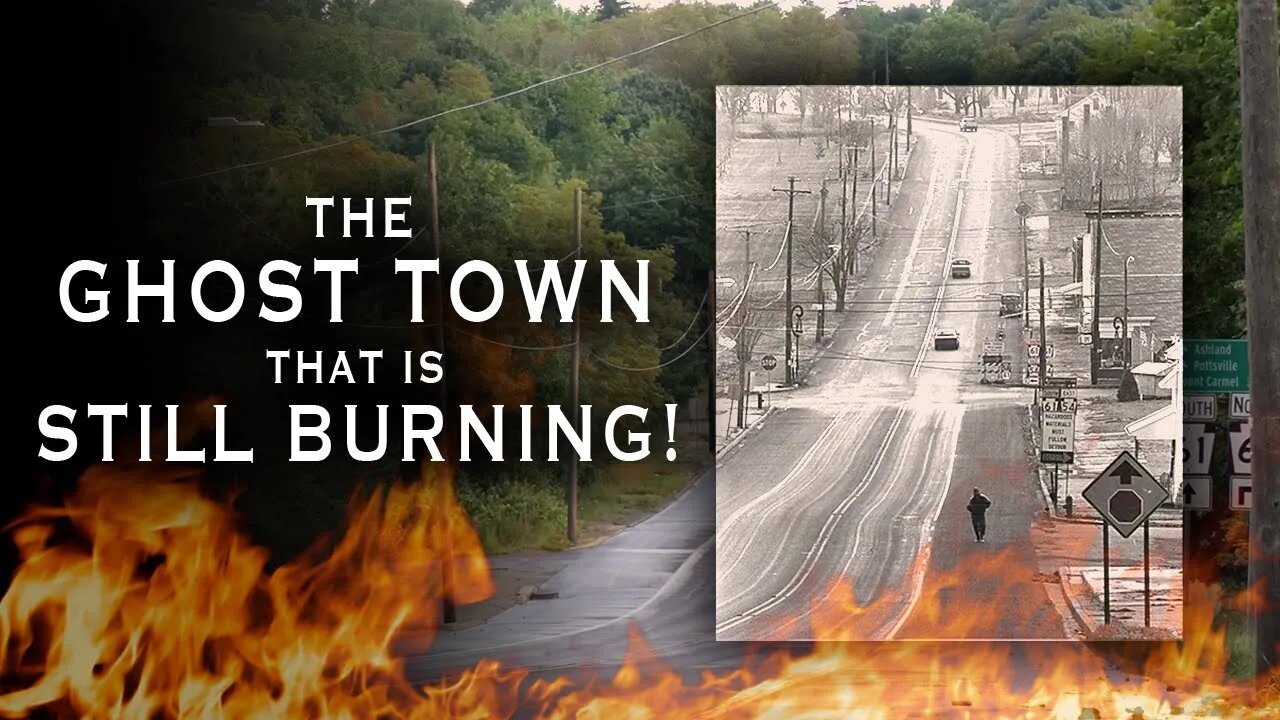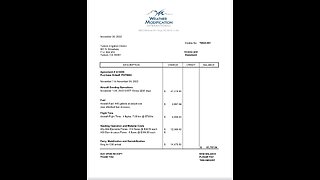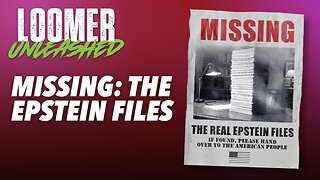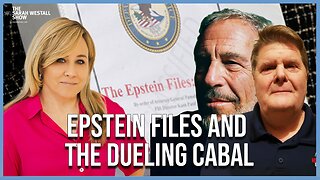Premium Only Content

Stolen Land America's Burning Ghost Town CENTRALIA, PA
I believe they created the problem and profited of the misery of the people who lived in Centralia, PA. THEY FUMBLED THE ENTIRED SITUATION AND MADE IT WORSE
THIS COULD HAPPEN TO ANY OF US ESPECIALLY WITH ALL THE RECENT RAIL ACCIDENTS!!
JPMorgan CEO Suggests Gov’t Should Seize Private Property For Clean Energy Projects
https://dailycaller.com/2023/04/05/jpmorgan-ceo-jamie-dimon-eminent-domain-green-energy/
Poison and private police: Norfolk Southern destroys East Palestine
https://rumble.com/v2betqm-poison-and-private-police-norfolk-southern-destroys-east-palestine.html
Iowa Senate panel advances bill to limit eminent domain for carbon an other pipelines
Dan Tronchetti of Paton said he and his wife have been farmers for more than 40 years.
“I thought I had property rights,” he said. “But Summit Carbon is telling me I don’t have property rights, that they can ask for eminent domain. And that I might as well go ahead and sign a voluntary easement. And I guess I just can’t believe that 40 years of hard work doesn’t mean anything.”
Kathy Stockdale of Iowa Falls said the Summit Carbon Solutions pipeline would cut her farm in half, and the Navigator CO2 Ventures pipeline might also affect her property.
“We have 30 acres of wetlands right over here…this is where the highly erodible land is,” she said.
“So we are concerned because it is very sandy soil. And when there’s rain, what’s going to happen to the pipe underneath?
A separate bill in the Iowa House would require pipeline companies to get approval from at least 90 percent of landowners in the pipeline’s path before beginning construction. The bill has not had a hearing.
Senate File 2160-Introduced SENATE FILE 2160BYJ.
TAYLOR A BILL FOR An Act relating to certain actions of utility companies and the Iowa utilities board and including applicability provisions. 2 BE ITENACTED BY THE GENERAL ASSEMBLY OF THE STATE OF IOWA:
https://www.legis.iowa.gov/legislation/BillBook?ba=SF2160&ga=89
Eminent domain in the United States
https://en.wikipedia.org/wiki/Eminent_domain_in_the_United_States#Condemnation
Eminent domain in the United States refers to the power of a state or the federal government to take private property for public use while requiring just compensation to be given to the original owner.
It can be legislatively delegated by the state to municipalities, government subdivisions,
or even to private persons or corporations, when they are authorized to exercise the functions of public character.
Property taken by eminent domain may be for government use or by delegation to third parties, who will devote it to public or civic use or, in some cases, to economic development.
The most common uses are for government buildings and other facilities, public utilities,
highways and railroads.
However, it may also be taken for reasons of public safety, as in the case of Centralia, Pennsylvania,
where land was taken due to an underground mine fire.
Some jurisdictions require that the condemnor make an offer to purchase the subject property, before resorting to the use of eminent domain.
Eminent Domain in Coal Country Called a Billion-Dollar Land Grab
With help from a law office, Pennsylvania and a county redevelopment agency abused their condemnation powers to help a coal company get its hands on billions of dollars worth of coal deposits,
the Borough of Centralia and its citizens say in a federal class action. Centralia claims the conspirators used the pretext of an underground fire to make a land grab:
a gross abuse of their powers of eminent domain.
"The original government pretense, if indeed it was ever legitimate, has long since expired," the complaint states. "In short, the purported 'Centralia Mine Fire,' which allegedly threatened the Borough of Centralia, no longer provides, or never did provide,
a viable explanation for the application of government power (exercise of eminent domain) and the taking of these American citizens' property."
The class claims that hundreds of fires occur in Pennsylvania abandoned mines, particularly the anthracite coal mining region in and around northeast Pennsylvania.
The so-called "Centralia Mine Fire" started in 1962 in an abandoned coal stripping pit that Centralia used as a trash dump.
The class adds that any evidence that the fire actually endangered Centralia was "contrived,"
and that "no court has ever held a hearing to determine whether the fire is, or ever was, a threat," that "certainly it does not threaten Centralia now and is retreating at its worst."
https://www.courthousenews.com/eminent-domain-in-coal-countrycalled-a-billion-dollar-land-grab/
Mineral Rights and Eminent Domain: What you Need to know
Inside The Eerie Ghost Town Of Centralia, Pennsylvania That’s Been On Fire Since 1962
https://allthatsinteresting.com/centralia-pa
The 7 Most Important Eminent Domain Cases
https://www.thoughtco.com/eminent-domain-cases-4176337
Inside Centralia, The Abandoned Town That's Been On Fire For 60 Years
Eminent domain is the act of taking private property for public use. Enumerated in the Fifth Amendment of the U.S. Constitution, it gives states and the federal government the right to seize property for public use in exchange for just compensation
(based on fair market value for a piece of land).
The concept of eminent domain is connected to the functionality of the government, because the government needs to acquire property for infrastructure and services like public schools, public utilities, parks, and transit operations.
Seven key court cases throughout the 19th and 20th centuries allowed the judiciary to define eminent domain.
Most eminent domain challenges focus on whether the lands were taken for a purpose that qualifies as “public use” and whether the compensation provided was “just."
Kohl v. United States
Kohl v. United States (1875) was the first U.S. Supreme Court case to assess the federal government’s eminent domain powers. The government seized a portion of the petitioner’s lands without compensation for the purpose of building a post office, customs office, and other government facilities in Cincinnati, Ohio. The petitioners alleged that the court did not have jurisdiction, the government could not acquire the land without proper legislation, and that the government should accept an independent assessment of the land's value before compensating.
In a decision delivered by Justice Strong, the court ruled in favor of the government. According to the majority opinion, eminent domain is a core and essential power afforded to the government through the Constitution. The government may develop legislation to further define eminent domain, but the legislation is not required to make use of the power.
In the majority opinion, Justice Strong wrote:
“If the right of eminent domain exists in the federal government, it is a right which may be exercised within the states, so far as is necessary to the enjoyment of the powers conferred upon it by the Constitution.”
United States v. Gettysburg Electric Railroad Company
In United States v. Gettysburg Electric Railroad Company (1896), Congress used eminent domain to condemn the Gettysburg Battlefield in Pennsylvania. The Gettysburg Railroad Company, who owned land in the condemned area, sued the government, alleging that the condemnation violated their Fifth Amendment right.
The majority ruled that as long as the railroad company was paid fair market value for the land, the condemnation was lawful. In terms of public use, Justice Peckham, on behalf of the majority wrote, “No narrow view of the character of this proposed use should be taken. Its national character and importance, we think, are plain.” Furthermore, the court held that the amount of land needed in any eminent domain seizure is for the legislature to determine, not the court.
Chicago, Burlington & Quincy Railroad Co. v. City of Chicago
Chicago, Burlington & Quincy Railroad Co. v. City of Chicago (1897) incorporated the Fifth Amendment takings clause using the Fourteenth Amendment. Prior to this case, states had used eminent domain powers unregulated by the Fifth Amendment. This means that states may have seized property for public use without just compensation.
In the 1890s, the city of Chicago aimed to connect a stretch of road, even though it meant cutting through private property. The city condemned the land through a court petition and paid just compensation to the property owners. Quincy Railroad Corporation owned part of the condemned land and was awarded $1 for the taking, prompting the railroad to appeal the judgment.
In a 7-1 decision delivered by Justice Harlan, the court ruled that the state could take land under eminent domain if the original owners were awarded just compensation. The taking of the Railroad Company’s land had not deprived the company of its use. The street only bisected the railroad tracts and did not cause the tracts to be removed. Therefore, $1 was just compensation.
Berman v. Parker
In 1945, Congress established the District of Columbia Redevelopment Land Agency to authorize the seizure of “blighted” housing districts for rebuilding. Berman owned a department store in the area slated for redevelopment and did not want his property to be seized along with the “blighted” area. In Berman v. Parker (1954), Berman sued on the basis that the District of Columbia Redevelopment Act and its seizure of his land violated his right to due process.
In a unanimous decision delivered by Justice Douglas, the court found that the seizure of Berman’s property was not a violation of his Fifth Amendment right. The Fifth Amendment does not specify what the land must be used for outside of “public use." Congress has the power to decide what this use might be and the goal of turning the land into housing, specifically low-income housing, fit the general definition of the takings clause.
The majority opinion by Justice Douglas read:
“Once the question of the public purpose has been decided, the amount and character of land to be taken for the project and the need for a particular tract to complete the integrated plan rests in the discretion of the legislative branch.”
Penn Central Transportation v. New York City
Penn Central Transportation v. New York City (1978) asked the court to decide whether a Landmark Preservation Law, which restricted Penn Station from building a 50-story building above it, was constitutional. Penn Station argued that preventing the construction of the building amounted to an illegal taking of the airspace by the City of New York, violating the Fifth Amendment.
The court ruled in a 6-3 decision that the Landmarks Law was not a violation of the Fifth Amendment because restricting the construction of a 50-story building did not constitute a taking of the airspace. The Landmarks Law was more closely related to a zoning ordinance than eminent domain, and New York had a right to restrict construction in the public interest of protecting the “general welfare” of the surrounding area. Penn Central Transportation could not prove that New York had meaningfully “taken” the property simply because they had lowered the economic capacity and interfered with the property rights.
Hawaii Housing Authority v. Midkiff
Hawaii’s Land Reform Act of 1967 sought to tackle the issue of unequal land ownership on the island. Seventy-two private landowners possessed 47% of the land. Hawaii Housing Authority v. Midkiff (1984) asked the court to determine whether the state of Hawaii could enact a law that would use eminent domain to take lands from lessors (property owners) and redistribute them to lessees (property renters).
In a 7-1 decision, the court ruled that the Land Reform Act was constitutional. Hawaii sought to use eminent domain to prevent a concentration of private ownership, a purpose generally associated with good democratic governance. Additionally, the state legislature has just as much power to make this determination as Congress. The fact that the property was transferred from one private party to another did not defeat the public nature of the exchange.
Kelo v. City of New London
In Kelo v. City of New London (2005), the plaintiff, Kelo, sued the city of New London, Connecticut for seizing her property under eminent domain and transferring it to New London Development Corporation.
Susette Kelo and others in the area had refused to sell their private property, so the city condemned it to force them to accept compensation.
Kelo alleged that the seizure of her property was a violation of the “public use” element of the Fifth Amendment takings clause because the land would be used for economic development,
which is not solely public. Kelo’s property was not “blighted,” and it would be transferred to a private firm for economic development.
In a 5-4 decision delivered by Justice Stevens, the court upheld aspects of its ruling in Berman v. Parker and Hawaii Housing Authority v. Midkiff. The court ruled that redistributing the land was part of a detailed economic plan that included public use.
Even though the transfer of land was from one private party to another, the goal of that transfer–economic development–served a definitive public purpose. In this case, the court further defined “public use” by explaining that it was not confined to literal usage by the public.
Rather, this term could also describe public benefit or general welfare.
Sources
Kohl v. United States, 91 U.S. 367 (1875).
Kelo v. New London, 545 U.S. 469 (2005).
United States v. Gettysburg Elec. Ry. Co., 160 U.S. 668 (1896).
Penn Central Transportation Co. v. New York City, 438 U.S. 104 (1978).
Hawaii Housing Auth. v. Midkiff, 467 U.S. 229 (1984).
Berman v. Parker, 348 U.S. 26 (1954).
Chicago, B. & Q. R. Co. v. Chicago, 166 U.S. 226 (1897).
Somin, Ilya. “The Story behind Kelo v. City of New London.”
The Washington Post, 29 May 2015,
“History of the Federal Use of Eminent Domain.”
The United States Department of Justice, 15 May 2015,
www.justice.gov/enrd/history-federal-use-eminent-domain.
“Constitutional Law. Federal Power of Eminent Domain.” The University of Chicago Law Review, vol. 7, no. 1, 1939, pp. 166–169. JSTOR, JSTOR,
“Annotation 14 - Fifth Amendment.” Findlaw,
constitution.findlaw.com/amendment5/annotation14.html#f170.
Famous across the world for the ongoing underground fire which forced the town's abandonment, Centralia is located in central Pennsylvania. Let's explore the remains of this town, looking into the history before the fire, from plane crashes to gang violence with the Molly Maguires, through the causes of the fire, and to the terrible management of the situation which led to the near-total abandonment of a town that once was home to nearly 3,000 people.
Segments:
0:00 - Introduction
1:22 - Centralia's Early History
4:18 - The Molly Maguires
6:29 - Exploring Railroad Street and Later History
10:07 - The Fire Starts
13:37 - Centralia's Centennial Celebrations
15:00 - Decline of Centralia
18:02 - Coddington's Gas Station
20:54 - Todd Domboski's Sinkhole
22:11 - Relocation and Evictions
24:24 - Exploring the Remains of the Catholic and Orthodox Churches
26:22 - Highway 61, "The Graffiti Highway"
28:25 - Exploring the Neighboring Ghost Town of Byrnesville
31:45 - Opening the Centennial Time Capsule
32:54 - Centralia Today
35:30 - Finding Smoking Fissures
Fire Beneath 'Real-Life Silent Hill' Town Centralia Has Been Burning
original link found on Part-Time Explorer
-
 18:22
18:22
Watchman's Duty
23 days agoPilot caught admitting to regularly dumping T.0.X.I.C chemicals from his P.L.A.N.E
3.1K17 -
 10:31:05
10:31:05
Dr Disrespect
19 hours ago🔴LIVE - DR DISRESPECT - PGA TOUR 2K25 LAUNCH DAY
204K29 -
 2:30:04
2:30:04
Laura Loomer
10 hours agoEP105: MISSING: The Epstein Files
88.6K61 -
 1:46:14
1:46:14
Kim Iversen
11 hours agoTrump to Zelenskyy: 'You're Gambling with World War III'
96.9K140 -
 55:28
55:28
Glenn Greenwald
13 hours agoGlenn Reacts to Trump-Zelensky Exchange and Takes Q&A from our Members | SYSTEM UPDATE #415
148K245 -
 4:26:54
4:26:54
Nerdrotic
15 hours ago $41.14 earnedMarvel PANIC MODE! Kathleen Kennedy GONE?! Hollywood DEI Dead | Friday Night Tights 342 Nick Freitas
156K41 -
 1:30:03
1:30:03
Flyover Conservatives
1 day agoZelensky Fail... God Called IT!; From Prison to the White House: Angela Stanton King’s Unbelievable Redemption Story | FOC Show
66.1K6 -
 1:06:14
1:06:14
IsaacButterfield
15 hours ago $2.55 earnedFree Speech Is Dead | Did Trump Go Too Far? | Sexist Job
54.5K21 -
 1:02:59
1:02:59
Sarah Westall
17 hours agoEpstein Files, Dueling Cabal Factions and Gold from Ancient Civilizations w/ Dave Hodges
81.9K34 -
 3:15:08
3:15:08
I_Came_With_Fire_Podcast
15 hours ago“Trump-Zelensky BEATDOWN | Europe BUILDS MUSCLE | NEWSCUM Podcast”
25.1K3